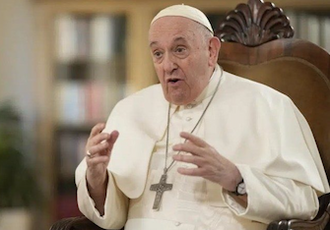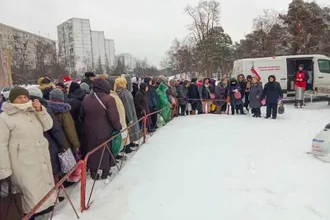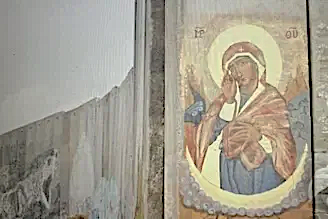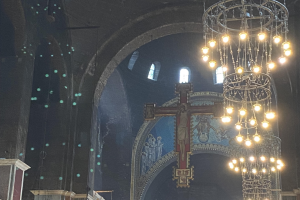Pope: Critics help us grow, but I want them to say it to my face

Image: Vatican Media
Source: Vatican News
Pope Francis has condemned laws that criminalise homosexuality, and called for bishops not to discriminate against LGBT people but to welcome them. In a wide-ranging interview with Associated Press correspondent Nicole Winfield, released yesterday, the Pope also spoke about Benedict XVI, criticism of his own papacy, relations with China, the case of Father Rupnik, and his own health.
Speaking in Casa Santa Marta, the Pope described Benedict XVI as "a gentleman" and said that with his death "I lost a father."
He said: "For me, he was a security. When faced with doubt, I would call for the car, go to the monastery and ask him about it."
On the possibility of his own resignation, the Pope said if he ever resigned, he would use the title "bishop emeritus of Rome" and live in the Casa del Clero (a residence for clergy) in Rome." "Benedict's experience," he added, already gives future popes greater freedom to choose to resign.
Pope Francis explained that his predecessor was still bound to a certain conception of the papacy: "In this, he was not completely free, because he might have wanted to return to his own land of Germany and continue studying theology from there. But he did everything he could to be as close as possible. And that was a good compromise, a good solution."
Reflecting on his own pontificate, which will reach the ten-year mark on 13 March, Pope Francis said at first, the news of a South American pope was greeted with surprise by many inside and outside the Church. Later, he said, "they began to see my flaws and they didn't like them."
Concerning criticism he has received recently, through books and documents circulated among cardinals under pseudonyms, Pope Francis said that for him, as for everybody, it is better not to be criticised, for the sake of his "peace of mind." But although criticisms are "like a rash, a bit annoying," the Pope said, "I prefer them, because it means there is freedom of speech." He added that what is important, is that criticisms should be made "to our faces because that's how we all grow." Criticism is worse, when it is "underhanded," he said.
The Pope noted that he had spoken with some of his critics. "Some of them have come here and yes, I have discussed things - normally, as one speaks with mature people. I did not argue with anyone, but I expressed my opinion and they expressed theirs. Otherwise, you create a dictatorship of distance, as I call it, where the emperor is there and nobody can say anything to him. No, let them say because the companionship, the criticism, helps us to grow and make things go well."
Pope Francis was then asked about the issue of homosexuality. Being homosexual, he said, "is not a crime" but is a part of the "human condition." With regard to the rights of people who identify as LGBT, the Pope said: "We are all children of God, and God wants us as we are and with the strength that each of us fights for our dignity."
The Pope then imagined a dialogue between two people. Someone might say that homosexuality "is a sin." In response, the Pope clarified: "First we distinguish between sin and crime," adding, "It is also a sin to lack charity toward one another."
Pope Francis went on to criticise laws that criminalise homosexuality, which he described as "unjust." He said: "I think there are more than 50 countries that have legal condemnation and of these, I think about 10, a little bit more or less, have the death penalty for homosexuality. They don't mention it directly, but they say "those who have unnatural attitudes."
He then called on bishops who discriminate against persons with homosexual attractions and LGBT communities to take a different approach. The Pope the mentioned the Catechism of the Catholic Church which affirms "that people with homosexual tendencies must be welcomed, not marginalized..."
No one should be discriminated against, the Pope insisted, adding that this is not just a question of homosexuality. "Even the worst murderer, the worst sinner should not be discriminated against. Every man and woman should have a window in their life to which they can turn their hopes and where they can see the dignity of God."
In her interview Nicole Winfield asked Pope Francis about the case of Jesuit Fr Marko Rupnik, the famous artist who has been accused of sexual and psychological abuse, and abuse of conscience, by several nuns. The abuse is alleged to have taken place some 30 years ago.
"For me it was a surprise, really," Pope Francis said. "This person, an artist of this level, for me it was a big surprise and a wound." The Pope insisted that he did not play a role in the management of the case but intervened only procedurally "in a small process that reached the Congregation of the Faith in the past." Specifically, he explained that he gave indications so that a second set of charges would be dealt with by the same tribunal that had screened the first. Pope Francis then gave a glimpse of his reasoning: "Let it continue with the normal tribunal... Otherwise the procedural paths get divided and everything gets confused."
Asked why he did not waive the statute of limitations in Rupnik's case, Pope Francis said it is "always" right to waive the statute of limitations in cases involving minors and "vulnerable adults," but that it is important to maintain traditional legal safeguards with cases involving other adults, as was the case with Fr Rupnik.
The Pope went on to discuss several other issues, including the diplomatic work carried out by the Holy See. Speaking on the issue of relations with China, he stated: "We have to walk patiently." Regarding possible openings, Pope Francis said, "We are taking steps," while noting that Chinese authorities "are sometimes a bit closed, sometimes not." He repeated once again, "The essential thing is that dialogue is not interrupted."
Turning to the German "Synodal Path," which has made demands such as opening the priesthood to women and the abolition of priestly celibacy, Pope Francis warned of the risk of the process becoming damagingly "ideological." Dialogue itself is good, he said, while affirming that "the German experience does not help." The Pope noted that, so far, the process in Germany has been led by an "elite" while not involving "the whole people of God." He said: "The danger is that something very, very ideological comes in. When ideology gets involved in church processes, the Holy Spirit goes home, because ideology overcomes the Holy Spirit."
Pope Francis also commented on Chinese Cardinal Joseph Zen, who he described as "fascinating." The Holy Father received Cardinal Zen recently, on January 6, at the Vatican. Cardinal Zen, the Pope noted, is now doing pastoral work in prison - "and he is in prison all day. He is friends with the Communist guards and the prisoners. Everyone welcomes him. He is a man of great sympathy." Cardinal Zen "is brave," but also "a tender soul" the Pope said, recalling that the Cardinal "wept like a child" in front of the statue of Our Lady of Sheshan that he saw in the papal apartments in Casa Santa Marta.
The interview also touched on the Pope's health, which the Holy Father described as "good," considering his age (he turned 86 in December). At the same time, the Pope spoke about some health issues. Although the diverticulitis - for which he underwent colon surgery last July - has "returned," the Pope said, "it is under control."
Pope Francis revealed that a small knee fracture, caused by a fall, had healed without surgery. "I'm already walking, helping myself with the wheelchair, but I'm walking."
For his age, he repeated, everything is "normal." He joked, "I could die, even tomorrow, but come on, everything is under control. My health is good. And I always ask for grace, for the Lord to give me a sense of humour!"


















